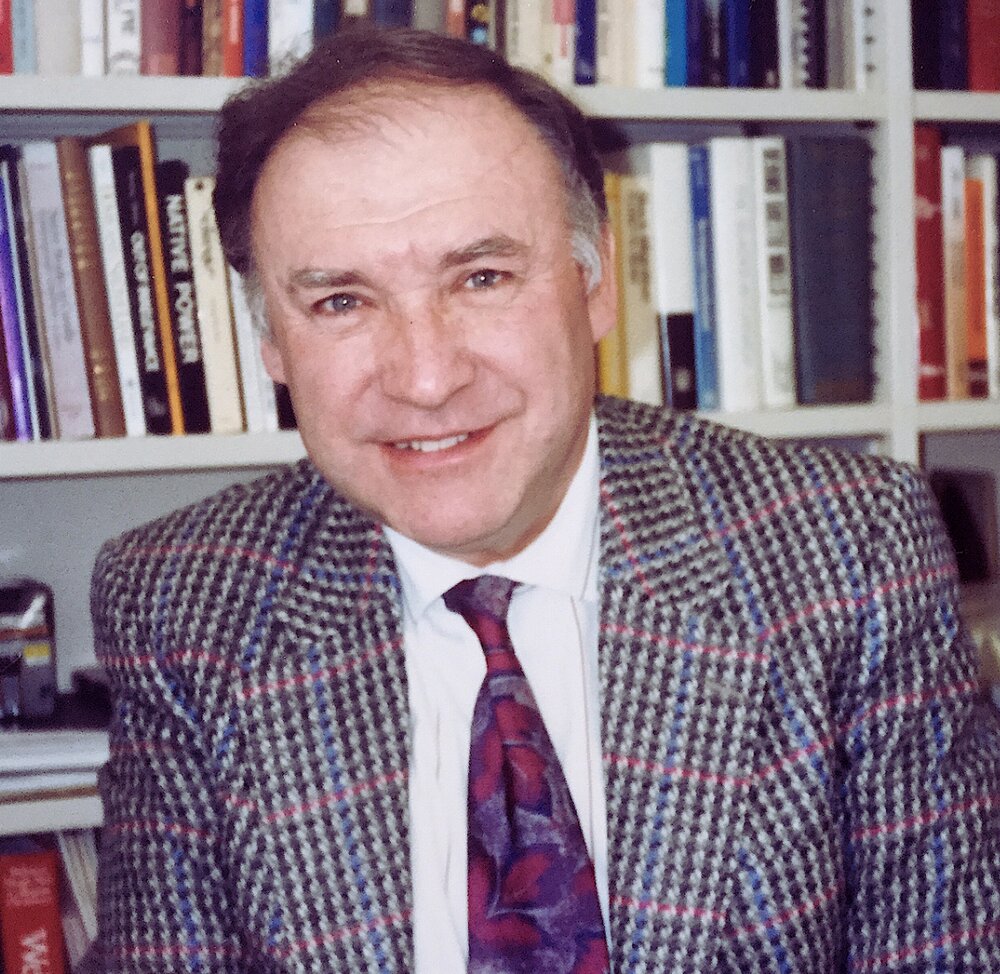
Obituary of Wsevolod W. Isajiw
Wsevolod W. Isajiw, 89, scholar and expert on social thought, sociological theory, and ethnic, immigration, and pluralism studies, dies in Toronto
Dr. Wsevolod W. Isajiw, sociologist, educator, and author, died 28 February 2023 at home peacefully in Toronto, Canada. He was 89 years old. He was born in 1933 in Lviv, Ukraine, to parents Yaroslawa Stefania (née Konrad in Ternopil, Ukraine) and Petro Markian Isajiw (né in Lisky, Kolomiya district, Stanyslaviv [now Ivano-Frankivsk] province, Ukraine), who were married on 5 January 1904.
Dr. W. W. Isajiw’s expertise, distilled in his many writings, left its mark on the fields of sociology and social thought. He contributed research and insights into scholarship on ethnicity, ethnic groups, and ethnic identity. He was a Professor Emeritus at the University of Toronto, where he lectured in sociology and sociological theory from 1970 until 1999. He also taught at the University of Windsor, Ontario, and at St. John’s University in Queen’s, New York. He taught courses on the history of social thought and on ethnic and race relations and engaged in empirical research for forty years. As the Petro Jacyk Distinguished Fellow/Visiting Professor at Harvard University’s Ukrainian Research Institute (2002/3), he organized HURI’s inaugural biennial symposium, which in 2003 presented the first-ever look at the sociology of Ukrainian émigré communities, discussing the state of the Ukrainian diaspora in North America and its relations with independent Ukraine. Dr. Isajiw additionally held visiting professorships at the University of Manitoba (Winnipeg), University of Saskatchewan (Saskatoon), the Ukrainian Freie Universität (Munich; a multi-year post), and Macquarie University (Sydney, Australia); he was also on the faculty of the Ukrainian Catholic University (Rome) and a presenter at many international conferences and yearly visiting lectures and conferences. As an educator, Professor Isajiw supervised over 26 Ph.D. dissertations.
He was the author, co-author, and editor of 14 scholarly books and over 109 articles and research papers, some written in Ukrainian. His first textbook, Understanding Diversity: Ethnicity and Race in the Canadian Context (Toronto, 1999), is a Thompson Educational Publishing reference for information about diversity, ethnic origins, and ethnic group distribution in Canada that encourages Canadians to think productively about ethnicity and race. The second textbook, Iconic Ideas in the History of Social Thought (Victoria, 2016), distinguishes a number of types of social thought and traces their history from tribal times to the present day, ending with a discussion of the future of social thought. Isajiw’s much-reprinted articles include “Definitions of Ethnicity” (1974) and “Olga in Wonderland: Ethnicity in Technological Society” (1977).
His well-known 1990 study “Ethnic Identity Retention” (with three co-authors) analyzed the results of a survey of 2,000 people from three generations of four major ethnic groups in Metropolitan Toronto (Italians, Ukrainians, Germans, and Jews). It focused on indicators of identity and ethnic identity retention, transmission, or assimilation across three generations. To date, this study has been successfully replicated and verified with other ethnic groups in three countries around the globe.
Wsevolod W. Isajiw left Lviv in his teens during WW2, through Displaced Persons camps in Germany, and landed in Philadelphia, where his parents settled and lived until their deaths. After graduating from high school in 1951, he obtained a sociology degree at LaSalle College (now University) in Philadelphia in 1955. He received an MA in Sociology (1957) and Ph.D. in Sociology (1967) from the Catholic University of America in Washington, DC. He accepted a professorship at the University of Toronto in 1970 and soon afterward established the Small Groups Laboratory for social psychology research projects there. The Small Groups Lab implemented a systematic method of group observation and measurement of interaction processes, developed for helping people to better understand how they interact. It followed the Robert Freed Bales model at Harvard University, where Isajiw had done post-doctoral research with Bales and Talcott Parsons. At the University of Toronto laboratory, Professor Isajiw conducted various research projects, including on mothers with children, young adults, and children of the first wave of Ukrainian immigrants to Canada. It was later named the “W. W. Isajiw Small Groups Lab” in his honour.
He was the first appointee to the position of Chair of The Robert F. Harney Professorship and Program in Ethnic, Immigration and Pluralism Studies at the University of Toronto’s Department of Sociology (1990–99), where he established the first interdisciplinary collaborative graduate program in ethnic studies in Canada, funded by the Secretary of State, and ran a series of highly successful annual conferences that were popular with students and faculty.
Wsevolod Isajiw held dual citizenship and was very proud to be a citizen of both the United States of America and Canada, voting regularly in elections in both countries.
On 20 June 2006 Pope Benedict XVI acknowledged Wsevolod W. Isajiw with a bestowal of Papal Honours at the Cathedral Church of Saint Michael in Toronto, naming him a Knight in the Order of Saint Gregory the Great for his “significant contribution to Catholic education, especially in connection with proposed changes to ‘The Education Act,’ which would have prevented Catholic School Boards from considering an individual’s faith when making employment decisions.”
He served as president of the Canadian Ethnic Studies Association (1973–77) and was a member of the American Sociological Association, the Canadian Sociology and Anthropology Association, the Shevchenko Scientific Society (US and Canada), and others. He was president of the Ukrainian Canadian Research and Documentation Centre (UCRDC) for 10 years (2003–13), as well as a member of its board since 1983, helping to research and produce the UCRDC’s award-winning watershed film about the 1932–33 Holodomor, Harvest of Despair (1983), and the film’s related publication.
Dr. W. W. Isajiw is survived by the love of his life, his wife Christina, whom he met at a Ukrainian students’ picnic in Washington, DC and with whom he enjoyed 62 years of marriage together; two daughters, Marta Budu-Arthur (Kwesi) of Boston and Sophia of Toronto; and two sons, Mark (grandchildren Adrian, Nicholas, and Grant) of Oakville, Ontario, and Christopher (Sonia) of Boston, as well as his sister Olha (Marlton, NJ) and brothers George (Lansdown, PA) and Irenaeus (Newton, NJ).
Wsevolod was a consummate and always very patient educator, extremely generous with his time when mentoring students. He was someone who never boasted of the many significant achievements of his career, never maligned other human beings, and never complained about what life dealt him. In the final decade of his life, he endured Parkinson’s disease and scoliosis with humility and grace. When he received the Parkinson’s diagnosis, he quietly accepted it with the words, “Our Father, Thy will be done.” He lived out his values through his actions. He was a loving and generous father, devoted to his family, and he was very much beloved and deeply appreciated by his four children. He carried out his responsibilities to both family and career with unfaltering dedication and commitment. Kind and patient, he is regularly described by many as a “true gentleman,” which indeed he always was. May his soul find eternal rest and peace. Вічна пам’ять!
Wed. March 15:
5-8pm Visitation
7pm Panakhyda (service)
at Humphrey Funeral Home, 1403 Bayview Avenue, East York (Toronto), https://humphreymiles.com
Thurs. March 16:
11am Church service at Holy Eucharist Ukrainian Catholic Church, 515 Broadview Avenue, Toronto https://www.hagiaeucharistia.com followed by burial at Mount Hope Catholic Cemetary, 305 Erskine Avenue, Toronto
https://www.catholic-cemeteries.ca/cemeteries/mount-hope-catholic-cemetery/
A memorial celebration of life will take place in one year.
In lieu of flowers, please dedicate a donation in his name to help Ukraine with the Canada-Ukraine Foundation in Canada https://www.








